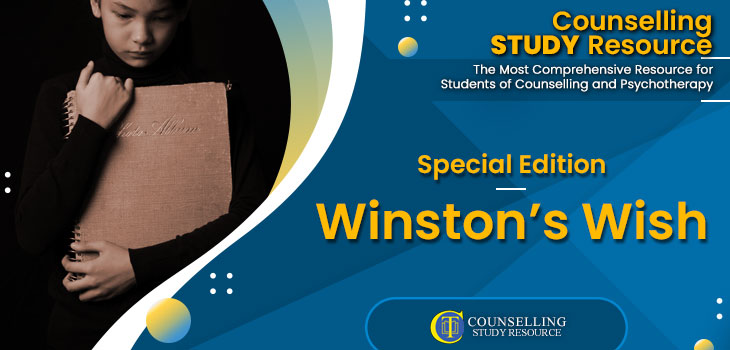Special Episode: Winston’s Wish
In this Special Episode of the Counselling Tutor Podcast, your host Rory Lees-Oakes speaks with Letizia Perna, the Director of Services and Service Transformation for the charity Winston’s Wish.
An introduction to Winston’s Wish:
- The first UK childhood bereavement charity.
- The charity turns 30yrs old this year (2023).
- They offer support, advice, and guidance for children and young people aged 0-25 who have lost someone important to them.
- This advice and guidance focuses on talking about death and dying.
Counselling Foundations is sponsored by
Counselling Skills Academy
Learn counselling techniques by seeing counselling skills used in real sessions by qualified therapists.
Real sessions - real-life presentations - real skills.
During this podcast, Rory and Letizia discuss some of the ways grief affects children and young people, and how to approach talking about death and bereavement:
- When it comes to helping little children – begin by helping them to understand what life is and what death is. You might do this using nature, e.g. the life cycle of a leaf through spring to autumn.
- As a child grows and develops, their understanding of death changes too – object permanence becomes something they understand more.
- Using language like ‘lost’ can be confusing for children; they may begin to think things along the lines of ‘well let’s go find them’.
- This is why it’s important to be very precise when speaking to children – using ‘clean’ language, factual and simple.
- It’s important to have these conversations in an open and honest way.
- Help children to name their emotions and put a label on how they're feeling.
- Grief is a constant journey – as they grow, continue to have these discussions and be open.
- Consider how the other relationships in their lives may of changed due to this loss.
- It can be an alienating experience – it’s likely they don’t know another child who has experienced what they have.
- Unresolved grief may cause behavioural changes.
- Grief is a really individual experience.
- It doesn’t end or stop hurting completely – give them the chance to talk about it, and don’t be afraid to revisit these difficult conversations.
- Use the word ‘death’.
- Grief can resurface during milestone events.
- Elisabeth Kübler-Ross’ five stages of grief – there is no perfect five chronological stages through grief, it is different for everyone and doesn’t reach a final destination.
- The importance of connecting with those who are dead. It may help some people to speak to their lost loved one or write a letter etc.
- Dual-Process Model – recognising that life does go on, trying to remove the guilt from going about life after the loss.
- The benefits of workbooks, journals, play/art therapy, letter writing, and music for a child or young person experiencing grief.
- Winston’s Wish believe in bringing children together, to show them they're not alone.
- They offer advice and introductory videos for those wanting to learn more about supporting children and young people through bereavement and sessions for both the bereaved and their caregiver.
- Winston’s Wish want to normalise bereavement and let children and young people have a voice and a space to voice their feelings and emotions.
The National Counselling Society is proud to sponsor Practice Matters.
NCS are really excited to have launched their Children and Young People Therapist Register for counsellors working with the younger age group.
To find out more, visit nationalcounsellingsociety.org or simply click the button below.


